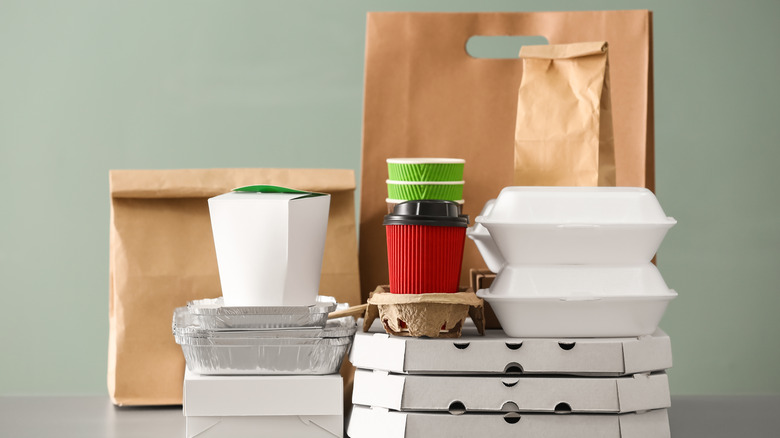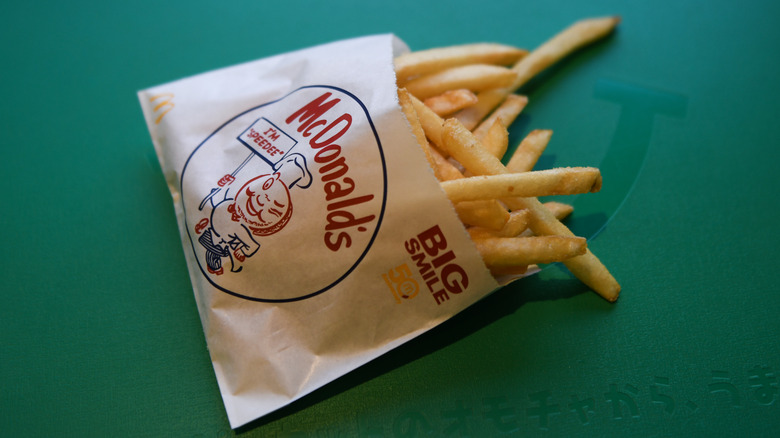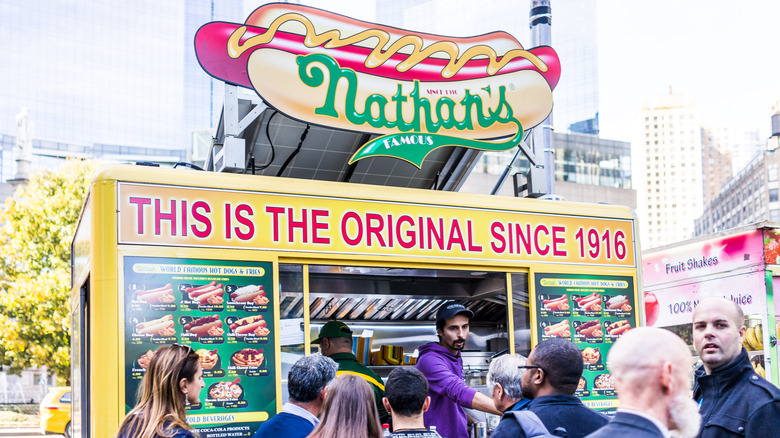New Report Reveals Scary Truth About Chemicals In Fast Food Packaging
We all love a good fast food snack when we're in a hurry or looking for a little comfort food — even if we know they aren't the healthiest meals in the world. A new study shows, however, that high cholesterol may not be the only thing we have to worry about in certain fast food staples, and the source is not from the food itself: It's from the packaging.
A study conducted by Consumer Reports shows that packaging materials from many popular food brands contain concerning levels of per- and polyfluoroalkyl substances, better known as PFAS or "forever chemicals." "PFAS are a large, complex, and ever-expanding group of manufactured chemicals that are widely used to make various types of everyday products," as explained by the National Institute of Environmental Health Science. And because they do not breakdown when exposed to the environment and are valued for their non-stick and moisture resistant properties, they're found in food packaging, water-repellent fabrics, and non-stick cookware.
Since their introduction to consumer products, the near-indestructible substances have seeped into the environment through landfills and into human bodies through contaminated drinking water and food which absorbed them through packaging. While completely avoiding them is nearly impossible, recent studies have shown that exposure to PFAS at high levels can have adverse health effects on humans over time including heightened cholesterol, low birthweight, weakened immune responses, and increased risk of certain cancers.
Reducing exposure
Since these potential health impacts have come to light, a number of organizations have begun pushing for the reduction of PFAS in products. The first target of the ban has been food packaging, since even more "eco-friendly" paper and cardboard packages can contain high levels of PFAS. According to Plastic Oceans, McDonald's has pledged to phase out PFAS in their packaging by 2025. Consumer Reports also noted that Chick-fil-A, Burger King, and Nathan's have all pledged to address the issue.
While CR notes that some exposure is unintentional, and it is unrealistic to expect any brand to reach zero PFAS in their packaging, the goal is finding an acceptable level. There is no universally agreed upon level at this point, though estimates range from 20 to 100 parts-per-million of organic fluorine in a product. Denmark has set the bar at the stricter end of the scale, banning packaging with more than 20 ppm, while California has made the first move against the products in the U.S. by declaring that paper food packaging containing more than 100 ppm will be banned in the state starting in 2023. It is possible that the requirement would be lowered later on.
With less of the substances in the food people consume, and less of the contaminated materials ending up in landfills, incinerators, or polluting the oceans, the hope is that these "forever chemicals" will be diluted in the environment and pose less of a risk to future generations.
Study results
The Consumer Reports study showed results from 118 products from 24 fast food and grocery retailers. Organic fluorine was present in over 50% the products, with 37 products coming in over the 20 ppm threshold and 22 failing to meet California's standard. While some retailers had very low levels in all their tested products, every company had at least some present in at least one product.
The worst category of products was paper bags and wrappers. Bags used for cookies and French fries and wrappers used for certain sandwiches had some of the highest levels, including Arby's cookie bags, McDonald's bags for cookies, fries, and chicken nuggets, Burger King's cookie and chicken nugget bags, as well as the Whopper wrappers, and Chick-fil-A's wrappers for sandwich wraps. All of these products exceeded 100 ppm, many multiple times over.
The retailer with the worst percentage of products in violation was Cava, with five out of six products coming in over the 100 ppm threshold, including sandwich wrappers and their fiber bowls and trays. The single worst item tested was Nathan's Famous' green striped side bags, which came in at 876 ppm, according to the CR study.
Retailers which performed particularly well included Five Guys, Freshii, Popeyes, Shake Shack, Smash Burger, and Wendy's, all of which had all their tested products come in under 20 ppm. White Castle, Whole Foods, Roy Rogers, Hannaford, and Checkers also performed very well. Each had only one product test between 20 and 30 ppm.


